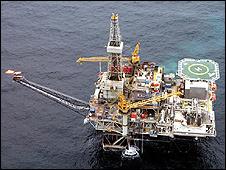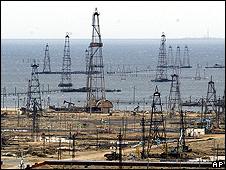Caspian Sea oil boom raises pollution fears
- Published

Chirag is one of the Caspian oil fields that BP is developing
The environmental disaster in the Gulf of Mexico has put offshore drilling operations in the Caspian Sea under fresh scrutiny.
Oil giant BP has been heavily involved in energy projects in Azerbaijan since 1997 and operates the Baku-Tbilisi-Ceyhan export pipeline, which carries Caspian crude oil to European markets via Turkey.
Non-governmental organisations (NGOs) in Azerbaijan have long challenged BP over the environmental impact of its Caspian drilling operations.
Some NGOs claim that an accident like the one off the US coast could happen in the Caspian Sea.
Green Party leader Farida Huseynova is especially worried about gas injection in the Caspian - a method used widely to ensure a steady flow of oil from the well.
She says using gas to increase the pressure and extract more oil is dangerous and nearly caused an accident in autumn 2008, as too much gas was used. "Gas was leaking and the workers said they could smell gas, which was about to trigger an accident."
The oil workers were evacuated and BP suspended oil production for several months at two Azeri fields.
But energy expert Prof Paul Stevens says gas injection does not increase the pollution risk. The procedure, known as "secondary recovery", is just a case of taking oil out of the reservoir and pushing gas in, he told the BBC.
Deep-sea risks
The Caspian drilling is done on fixed platforms, unlike the less stable, floating platforms used in the Gulf of Mexico, and in much shallower water - down to about 200m (660ft).
The BP spill off the US coast happened at a depth of nearly 1,524m (5,000ft), making repairs very difficult, as only robots can operate there.
The deep-sea drilling of relief wells to cut off the Gulf of Mexico leak is likely to continue until mid-August, whereas in the Caspian that could be done much faster, Prof Stevens said.
Hurricanes are an additional hazard in the Gulf of Mexico, he points out, while earthquakes are a risk in the Caspian Sea.

BP's spokeswoman in Baku, Tamam Bayatly, told the BBC Azeri Service that safety was a top priority in BP's Caspian operations.
The investigation into the Gulf of Mexico oil spill must first deliver its results, she said, then "we believe all the lessons from this incident should be acted on by the industry, to ensure that it never happens again".
Ms Bayatly insists that BP's health and safety measures in the Caspian are among the "most stringent" in the industry. "BP and its partners in the Caspian are using world-class technology."
Reacting to the Gulf of Mexico spill, the Azerbaijan State Oil Company (Socar) ordered extra safety checks at offshore platforms operated by foreign oil and gas companies in Azerbaijan's waters.

The legacy of Soviet-era oil production can be seen just south of Baku
"We are reminding these companies that they have to follow safety procedures," says Socar president Rovnag Abdullayev. He adds that high ecological and technical standards are maintained in offshore operations.
Some environmentalists say pollution has already greatly harmed the ecology of the Caspian Sea.
Telman Zeynalov, head of the National Ecological Forecasting Centre - an NGO - blames oil pollution, as well as poaching, for the decline of Caspian sturgeon, the fish that yields highly prized caviar.
Sturgeon under threat
He says BP's contracts limit official monitoring of its operations and put accurate ecological data beyond the reach of NGOs.
Oil pollution has affected the migration routes of sturgeon, according to the UN's Caucasus Environment Outlook in 2002.
It says sturgeon now swim through highly polluted water near Azerbaijan's Absheron Peninsula - and that is believed to limit their food and oxygen.
"Sturgeon cannot find fresh water to release their roe, because all the rivers flowing into the Caspian Sea have been polluted," Mr Zeynalov says.
He also alleges that some officials collude with poachers, which means the authorities "just seize small amounts, poached by ordinary people, but they don't go after those with tonnes".
The Caspian Sea's disputed legal status is also a risk factor for the environment.
The issue got far more complicated after the break-up of the Soviet Union, with five countries vying for the sea's resources: Azerbaijan, Iran, Kazakhstan, Russia and Turkmenistan.
There is still no international agreement about whether to class the Caspian as a sea or a lake - and that leaves the extent of territorial waters rather vague. It might be easier for a company or state to avoid responsibility if a major oil spill or other pollution incident happened in disputed waters.
- Published6 June 2010
- Published1 June 2010
- Published2 June 2010